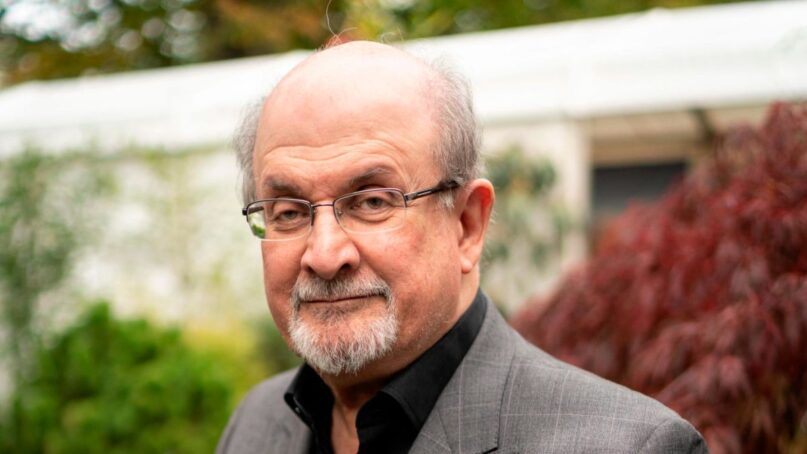(RNS) — The gruesome stabbing of the author Salman Rushdie in the peaceful intellectual retreat of Chautauqua, New York, raises critical questions about the increasing conflict between religious conceptions of blasphemy and freedom of speech. This is not a new conflict by any means, but the attack on Rushdie on American soil signals a disturbing turn of events.
Rushdie first shot to global notice in 1989 after the former supreme leader of Iran, Ayatollah Khomeini, issued a fatwa, or Islamic edict, calling for his death for writing “The Satanic Verses,” a novel that offended many Muslims with its depiction of the Prophet Muhammad. The fatwa helped galvanize Muslims worldwide against blasphemy, led to violent protests and finally culminated in the attack on Rushdie by a young Lebanese Muslim man last month.
Even before the fatwa, Rushdie’s native India had become the first of 13 countries to ban the book on the grounds that it would hurt the religious sentiments of Muslims under Indian Penal Code Section 295(A). The move was supported by many intellectuals and politicians at the time, including CNN commentator Fareed Zakaria’s father, Dr. Rafiq Zakaria.
RELATED: India’s insult of the Prophet Muhammad is a sign of deeper Islamophobia
Section 295(A), though not a true blasphemy law, has been used by communities in India to varied extents against perceived insults of their religions. It was implemented by the British in 1927 at the behest of the Muslim community and has its roots in a court case, Rajpal vs. King Emperor. In that case, a Hindu publisher, Mahashe Rajpal, was acquitted for publishing a pamphlet, Rangila Rasula, critical of Muhammad’s personal life. Rajpal, however, was killed in open court for committing blasphemy by a Muslim teenager, Ilm-ud-Din, revered as a saint in Pakistan to this day.
Since then, 79 countries across the world have adopted some form of laws with varying penalties to criminalize blasphemy, defined as “speech or actions considered to be contemptuous of God or of people or objects considered sacred.”
In Pakistan, for instance, draconian blasphemy laws impose severe punishments for perceived insults to the prophet or desecration of the Quran and prohibit Ahmadiyyas from using Islamic terminology and symbols and from “preaching their faith or pos(ing) as Muslims.”
The laws enjoy wide support from the population and carry criminal penalties ranging from imprisonment for three years and a fine to life imprisonment and the death penalty. More than 1,865 people have been charged and imprisoned in Pakistan under blasphemy laws since 1987.
The use of blasphemy as a pretext for mob violence or targeted attacks, particularly in connection to perceived insults to Islam or desecration of the Quran (or false accusations thereof), is similarly widespread. From high-profile murders of artists, journalists and teachers in Europe to the lesser-known, yet far more common, frenzied mob violence against religious minorities in Pakistan and Bangladesh, there is a long global track record of blasphemy-motivated violence.
In Pakistan, at least 129 people have been killed in extrajudicial violence. Mushtaq Ahmed, a mentally disabled man, was stoned to death for alleged blasphemy just a few months ago. As recently as last week, a violent mob of thousands of Muslim extremists nearly lynched a Hindu sanitation worker, Ashok Kumar, falsely accusing him of desecrating the Quran during a personal dispute.
Similarly, mob violence in Bangladesh over a false blasphemy allegation last October led to the deaths of 14 Hindus and destruction of 343 Hindu temples and 1,650 homes. Across the border in India, Kanhaiya Lal, a Hindu tailor in the state of Rajasthan, was beheaded by radical Islamists for a social media post supporting a ruling BJP spokeswoman, Nurpur Sharma, who made critical comments about Muhammad on national television.
The collective silence about many of these incidents by American intellectuals and public figures has fueled in part the normalization of blasphemy laws and its resultant violence around the world. Even former American President Jimmy Carter, who wrote an op-ed in 1989, “Rushdie’s Book Is an Insult,” contributed to the justification culture.
While the Rushdie stabbing has largely been condemned, very little of the discussion has focused on the heart of the issue, the growing conflict between blasphemy and freedom of speech. Instead, much of the conversation has only focused on one side of that conflict, the right to free speech.
And therein lies the rub.
Supporting free speech without simultaneously affirming that that right inherently includes the right to criticize religion, whether that religion is Islam or any other religion, is meaningless. Whatever the motivation — fear of offending Muslims or being accused of Islamophobia or some other reason — the bottom line is that it leads to self-censorship and defeats the very principle and purpose of free speech.
RELATED: What stabbed Salman Rushdie?
Perhaps more dangerously, it tacitly acknowledges that blasphemy laws are indeed justified to protect the sensibilities of religion and supersede the right to freedom of expression.
As a Pakistan Foreign Ministry statement so clearly put it in response to the republication of Prophet Muhammad cartoons in 2020, “Such a deliberate act to offend the sentiments of billions of Muslims cannot be justified as an exercise in press freedom or freedom of expression.”
Sadly, failure to confront the religious blasphemy side of the equation head on and speak out consistently against it, whenever and wherever it occurs, will only lead to more Rushdies on American soil.
(Samir Kalra is managing director of the Hindu American Foundation. The views expressed in this commentary do not necessarily reflect those of Religion News Service.)






